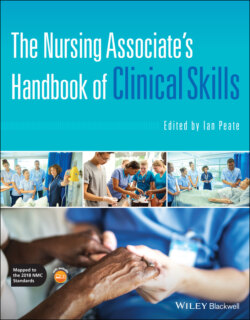Читать книгу The Nursing Associate's Handbook of Clinical Skills - Группа авторов - Страница 119
Blue Flag
ОглавлениеWhen working closely with patients, they will often tell you important things, and they may tell you these things because they have got to know you, they like you, they trust you and they can relate to you.
Hearing what patients are saying and truly listening and attending to what it is that they are saying is a key skill.
Despite these clear guidelines and requirements, communication is still an issue in healthcare, and there are regular complaints regarding how healthcare staff fail to communicate effectively. The data collected by The National Statistics for National Health Service (NHS) Digital in 2017–2018 found that 15.2% of complaints made about hospital and community health services were related to the communication skills of the healthcare team. This is clearly an issue that needs to be addressed, and effective communication skills cannot be assumed; they need to be learned. The Code (2018b) mentions communication throughout highlighting communication skills under the theme of Practise Effectively and states that the nursing associate must communicate clearly, and in order to achieve this, the nursing associate must:
Use terms that people in your care, colleagues and the public can understand
Take reasonable steps to meet people’s language and communication needs, providing, wherever possible, assistance to those who need help to communicate their own or other people’s needs
Use a range of verbal and non‐verbal communication methods and consider cultural sensitivities to better understand and respond to people’s personal and health needs
Check people’s understanding from time to time to keep misunderstanding or mistakes to a minimum
Be able to communicate clearly and effectively in English.
